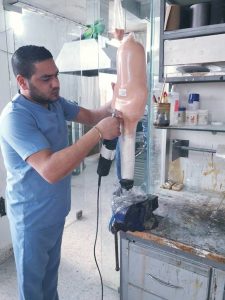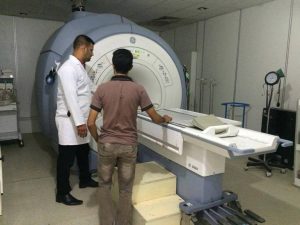BACHELOR OF SCIENCE in Biomedical Engineering
The duration of undergraduate programs is four years.
Biomedical engineering (BME) is a branch of electronic and computer engineering, which deals with various aspects concerning the application of electronics and computing to biomedical instrumentation and health-care systems. Such medical systems require the combination of analogue and digital electronic hardware, software engineering and signal processing algorithms in order to function. The challenge for engineers specializing in biomedical electronics is to apply their knowledge and skills towards the continuous development of medical diagnostic and monitoring systems, which will enable health-care professionals to deliver the best medical care to their patients.

Biomedical Engineering Specialty and Bachelor’s curriculum Bachelor is the first cycle of higher education:
- 4 years in full-time mode (240 ECTS credits); access to a master program (second cycle of higher education);
- the graduate (Bachelor) can hold such primary posts: Engineer Developer of the medical equipment, Health and Safety Engineers in hospitals, Engineer of scientific and technical information, medical equipment service engineer, advertising representative, teacher of a secondary educational
- theoretical study (218 ECTS credits) for subjects of classroom training (lectures, seminars, laboratories and practical studies) and student self-study. The volume of theoretical studies which provides basic qualification is 169 ECTS credits. The block of disciplines which provides advanced training in biomedical engineering is 49 ECTS credits;
- 4 term projects (4 ECTS credits);
- industrial practical training (3 weeks, 4,5 ECTS credits) and a pre-diploma training (3 weeks, 4,5 ECTS credits);
- preparation of a Bachelor’s thesis (9 ECTS credits).
Credits are awarded to a student in case of the successful assessment of the education course (written/oral tests or exams), positive evaluation of term projects, positive evaluation of practical training reports. A final state attestation includes defense of a Bachelor’s thesis.
The scientific fields of interest: Computerized medical imaging systems and image processing; biosignals and signal processing; biophysics; electronic equipment for laboratory research; SPA devices; rehabilitation engineering; biomaterials engineering; clinical monitoring systems; biomedical system modeling; biomedical instrumentation; radiotherapy; joint replacement; artificial organs; gait and motion analysis; nanotechnologies in medicine and ecology; photodynamic therapy of cancer, drug delivery systems, medical informatics and telecommunications; e-learning in bioengineering.
BME BSc professional activity:. Biomedical Hardware & Software development and setup; commercial supply and maintenance of clinical electronic equipment; rehabilitation engineering, prosthetics and artificial organs development, educational and research work in BME.

New technical means for teaching students:
Technical means for teaching students include modern purchased equipment (3D printer, 3D scanner, ECG system, pH-meter, atomic force microscope, spectrophotometer), hardware and software developed by the staff of BME department approved at the international level:
- the program module „Acuity of Vision V.1” for determination of human’s vision acuity;
- the program module „Field of Vision V.1” for determination of central field of vision;
- computer system “Color Ophtalmology” for establishment of the human’s color perception;
- computer audiometer;
- software and hardware systems for rhinomanometric research «Optimus»;
- system for noninvasive diagnostics of motor function of bodies of a digestive tract;
- program-instrument complex “ELUR-1” for urodynamic investigation;
- computer impedancemetry system;
- system for pulmophonographic research of lungs;
- the program module „X-RAYS V.3-V.5” for quantitative diagnostics of tubular bone osteoporosis;
- software „FOOTSTEP V.2” for investigation of a human’s flat-foot;
- the program module „SPINEINDEX V.1” for quantitative diagnostics of vertebra osteoporosis;
- automated system of ultrasonic diagnostics during pregnancy;
- automated system of heart and vessels dopplerogramm estimation;
- microfluidic electrochemiluminescent device for biomedical applications;
- software for the quantitative estimation of the carbohydrate exchange;
- hardware and software for orthopedics and diagnostics the musculoskeletal system;
- systems of surgical
The basic scientific institutions for BME research work and practical training at Kharkiv:
- Regional Clinical Hospital;
- Girshman Regional Ophthalmologic Hospital;
- Regional Military Hospital;
- Grigoriev Institute for Medical Radiology;
- Sytenko Institute of Spine and Joint Pathology;
- General and Emergency Surgery Institute;
- Institute of Neurology, Psychiatry and Narcology;
- Danilevskij Institute of Endocrinological Pathology;
- Malaya Institute of Therapy;
- Mechnikov Institute of Microbiology;
- Institute of Dermatology and Venerology;
- Institute of Children and Adolescents Health Care;
- Ukrainian Scientific-Research Institute of Prosthetics;
- Institute for Problems of Cryobiology and Cryomedicine;
- Institute of Experimental and Clinical Veterinary Medicine;
- Kharkiv Research Institute of Occupational Hygiene and Occupational
- joint-stock companies – manufacturers of medical electronic equipment, certificated service centers,
INTERNATIONAL COOPERATION:
Germany, Hannover, G.V. Leibniz University, cooperation from 2011 to the present
Entry requirements: It is expected that a Bachelor Degree applicant has the secondary school certificate (see Admission Procedure). Any student, holding Bachelor Degree in the BME can be admitted to Master Programs (see Admission Procedure).
